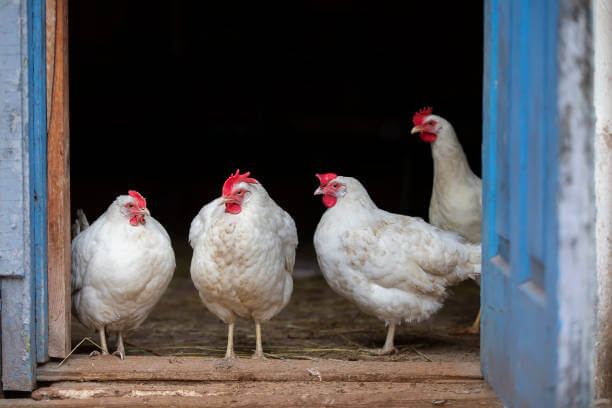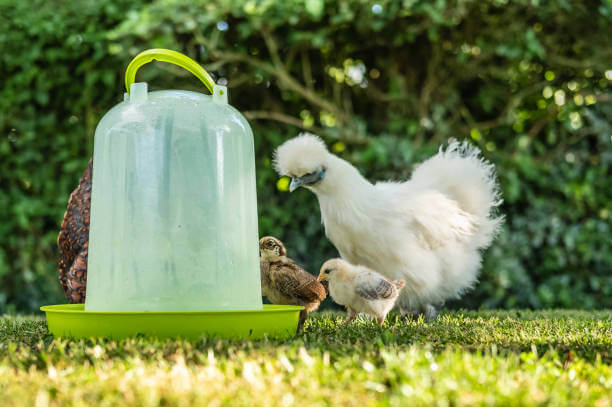Backyard chickens can provide fresh eggs and joy. But like all animals, they face health issues like foot problems. Healthy feet let chickens move, forage and live well. This blog covers common chicken foot issues, and how to spot, treat and prevent them for a healthy flock.
Bumblefoot (Pododermatitis)

Bumblefoot is a painful condition caused by a staphylococcus bacterial infection in a chicken's foot. This problem typically arises from a minor injury, like a splinter or cut, that becomes infected and results in swelling, redness, and the formation of a dark, hard scab on the footpad.
Treatment for Bumblefoot (Pododermatitis):
- Isolation: Immediately separate the affected chicken from the flock to prevent further injury and contamination.
- Soaking: Prepare a warm Epsom salt solution and soak the foot for 10-15 minutes daily to soften the scab and reduce inflammation.
- Cleaning: Gently clean the foot using a mild antiseptic or iodine solution.
- Debridement: Carefully remove the scab using sterilized tools, making sure to clean the wound thoroughly.
- Antibiotics: Administer antibiotics as prescribed by a veterinarian to combat bacterial infection.
- Bandaging: Apply an antibiotic ointment and bandage the foot to protect it from further injury and infection.
Scaly Leg Mites
Scaly leg mites are common parasites that infest a chicken's legs, burrowing under the scales, and causing them to lift and become rough and crusty. Left untreated, this condition can lead to severe discomfort and impaired mobility.
Treatment for Scaly Leg Mites:
- Isolation: Isolate the affected chicken to prevent mites spread to other flock members.
- Soaking: Soak the legs in warm, soapy water for about 20 minutes to soften the scales and crusts.
- Cleaning: Gently scrub the legs with a soft brush or cloth to remove the softened debris.
- Oiling: Apply petroleum jelly, vegetable oil, or a commercial leg mite ointment to suffocate the mites and smother their eggs.
- Repeat Treatment: Repeat the process every few days for a few weeks until the scales return to normal.

Frostbite
Chickens exposed to cold and freezing temperatures are at risk of developing frostbite, especially on their combs, wattles, and feet. Frostbite occurs when ice crystals form within the tissues, leading to cell damage.
Treatment for Frostbite:
- Warmth: Move chickens to a well-insulated and draft-free coop during cold weather to prevent further frostbite.
- Bedding: Increase bedding to provide insulation and warmth for their feet.
- Avoid Direct Handling: Do not handle frostbitten tissue directly, as it may be more prone to injury. Allow affected areas to heal naturally.
- Soothing: Apply aloe vera gel or vitamin E oil to soothe the damaged skin and promote healing.
- Preventive Measures: Apply a barrier cream, such as petroleum jelly, to exposed skin during cold snaps to protect against frostbite.
Footpad Dermatitis
Footpad dermatitis, or footpad burn, is caused by prolonged contact with wet and unsanitary surfaces, leading to painful sores on the footpads.
Treatment for Footpad Dermatitis:
- Improve Coop Hygiene: Regularly clean the coop and provide dry bedding to reduce moisture and bacteria buildup.
- Soaking: Soak the feet in warm water with a mild antiseptic solution to cleanse and soothe the irritated skin.
- Antiseptic Ointment: Apply an antiseptic ointment to the footpad to prevent infection and promote healing.
- Absorbent Bedding: Use absorbent materials like sand or wood shavings in the coop to keep the area dry and prevent footpad irritation.

Conclusion
As a backyard chicken owner, being vigilant about your flock's foot health is crucial to their overall well-being. Identifying common foot problems early and implementing appropriate treatment measures can prevent complications and discomfort for your feathered friends. Additionally, maintaining a clean and well-ventilated coop will go a long way in preventing foot-related issues. Remember, if you encounter any foot problem that you're unsure about or cannot treat effectively, consult with a veterinarian experienced in poultry care for professional advice and assistance. By providing your chickens with attentive care and addressing foot problems promptly, you'll ensure they continue to scratch, peck, and strut happily in your backyard.



Leave a comment
All comments are moderated before being published.
This site is protected by hCaptcha and the hCaptcha Privacy Policy and Terms of Service apply.